What is an Algorithm?
An algorithm is defined as “A set of rules for solving a problem in a finite number of steps “.
Whereas in computer language
“An algorithm sets the stage for the computer to perform a very specific task”.
What is a Google Algorithm?
Google algorithms are enacted to serve users with the best possible results for the queries asked.
Each year, Google changes its search algorithm number of times. While most of these changes are minor, Google occasionally rolls out a “major” algorithm update that affects search results in significant ways.
Google algorithm also follows the same basic definition and rule of an algorithm. Google algorithm partially uses keywords to determine page rankings
The search engine rolls out major algorithmic updates that significantly impact the SERPs such as:
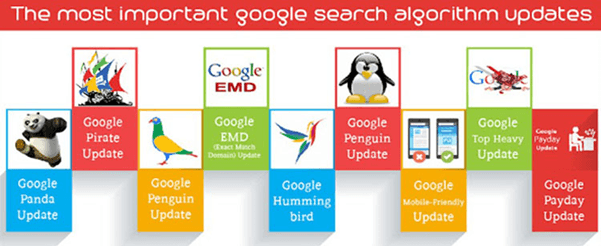
- Google Mobile-Friendly update (2018)
- Google Pirate update (2014)
- Google pigeon update (2014)
- Google Hummingbird update (2013)
- Google Payday update (2013)
- Google Top Heavy update (2012)
- Google EMD (Exact Match Domain) update (2012)
- Google Penguin update (2012)
- Google Panda update (2011)
Google Mobile-Friendly update:
The mobile-friendly update started rolling out on April 21, 2015, after being announced by Google in February 2015. The name given by webmasters and web developers to this Google Mobile-Friendly algorithm update is Mobilegeddon, it can also be referred to as Mobilepocalyse, Mopocalypse, Mobocalypse.
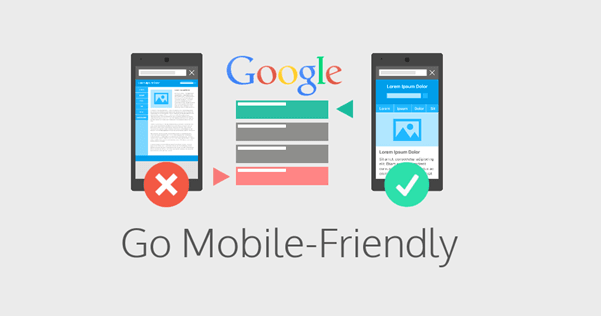
- This update applies to individual pages, not entire websites.
- It will affect only Rankings on mobile devices.
- It will affect search results in all languages globally.
Make your website Mobile Friendly:
Websites with Mobile-Friendly are not only the Ranking factor in 2019, but this is one of the most important factors to boost your ranks in Google Mobile searches.
Mobile-Friendly website is not an option these days, it became a requirement for every type of website. A mobile-friendly website must easily adjust to the mobile screen size and resolution while visitors are visiting the site through mobile. So, we must optimize our website for mobile devices to make easier for mobile users.
As it is a well-known fact that half of the online traffic comes from mobile devices, we should optimize the websites according to mobile devices to increase the traffic.
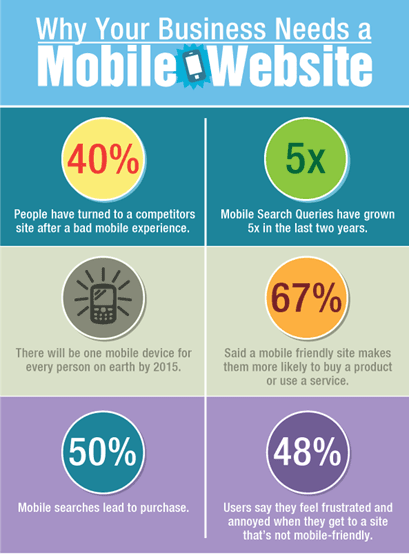
DO follow some steps to make a website Mobile Friendly:
- Make your website Responsive (The website should mold according to the device you access it is)
- Keep the website design simple, Keep content short and sweet.
- Use mobile plugins on popular CMS platform like WordPress mobile plugins, Joomla mobile plugins, Drupal mobile plugins.
- You should always perform a mobile website speed test to improve your performance across different devices.
Google Pirate Update:
Once you have Google Pirate update was introduced on 11 August 2012. It is basically a filter to prevent sites from copyright infringement complaints, via Google’s DMCA (Digital Millennium Copyright Act) system. This filter will catch new escaped pirated sites and also releases falsely accused sites. This Pirate update is Google’s algorithmic answer to piracy concern.

The sites which are penalized by Google Pirate algorithm can experience a drastic change in their revenue and may sometimes even takedown. For example, Mostly Torrent sites are affected by this Pirate algorithm because they share content without permission from the rightful owner. Some of the keywords which are mostly targeted by Pirate are “Download free movies” “Watch online movies” “online free movies” “movies download”. And some of the worst affected sites by pirate are Kickass.to, Thepiratebay.se, Torrentz.EU, Isohunt.

Google Pigeon update:
Google Pigeon update was released on July 24, 2014. This algorithm is mainly aimed to increase the ranking of local listing in a search. This update gives a better user experience who might be searching for locally available products and services.

This algorithm is more likely beneficial to small businesses (hospitality, shops, education, food, medical, law, transportation. This update built a stronger relationship between local search and traditional organic rankings.
Follow some content strategies to get an idea on how to adapt your content marketing strategies according to the latest updates:
- Avoid any low quality or duplicate content on your site
- Create as much as enough textual content in your website
- Do not try keyword stuffing avoid over-optimization
- Make sure your content covers 3 types: Informational, Transactional and Navigational
- Focus on keyword research, quality
- Produce high quality and natural backlinks
Google Hummingbird update:
On September 27, 2013, Google turned 15 years and to celebrate the occasion Google launched a new search algorithm named Google Hummingbird. It is Google’s claim that the new search algorithm can provide more Reliable and Relevant responses to your internet search queries in the future.

This algorithm plays a major role in deciding the ranking of websites and the latest update in this algorithm is it has the capability to possess a pointy eye on mobile marketing.
We should optimize (SEO ready) our website for easy ranking in google searches for Hummingbird algorithm like: Your content should contain Related keywords so that the search engine can display the content on the first page of results through which people can engage more on your site.
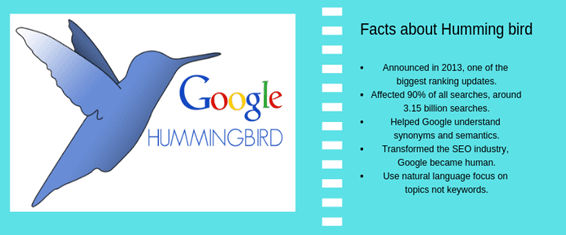
And to summarize, this Hummingbird resulted in an overall decrease of the variance in search results and this is significantly true for similar keyword semantics. Knowledge graph (not an actual graph, but rather a set of SERP feature) integration might not be common however they are turning into progressively specific.
Google Payday update:
The payday algorithm was launched on June 11, 2013. This algorithm’s main aim is to identify and penalize all those low-quality websites which are using spammy techniques to rank in search results. This Payday algorithm is similar to other algorithms like Google Panda, Google Penguin, Google Hummingbird which has its own individual search engine improvement focus.

To recover from the Google Payday algorithm, check the following.
- Your content should be trustworthy
- Your content should be unique
- Avoid grammatical mistakes
- Eliminate all spammy and unrelated stuff from your site
Once you have cleared all the things you can apply or request for reconsideration of your site. It is a request to google to check your site again after you have fixed all the issues. Google may consider your site again if it thinks your site is eligible.
Google Top Heavy update:
This Top heavy update was rolled out on 19 January 2012. This update will penalize sites that are Top heavy with ads from ranking well in its listings. Those sites with less content “above-the-fold” can be affected by this change. Sites with pop-ups pop-under or overlay ads are not affected by this; it only applies to static ads in fixed positions on pages.

Google EMD (Exact Match Domain) update:
Google EMD update first came on 29 September 2012. This update is similar to all other algorithms like Panda and Penguin. This match will affect “exact match” domains with low-quality content. This update will target sites that use exact match domain to rank for keywords in Google.
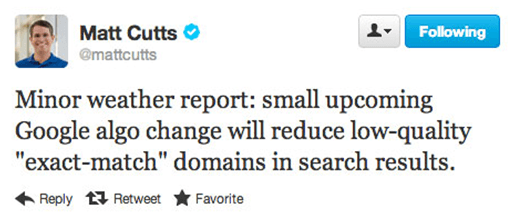
Exact match domains is a domain name that exactly matches the search query. By Adopting a technique like buying a domain with same as keywords name for that they want to rank so that they can easily rank for high demand keywords.
Example of EMD (Exact Match Domain):
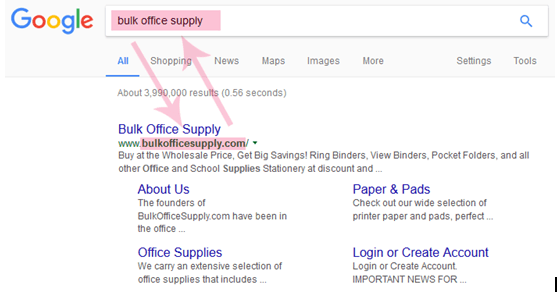
Some tips to reduce the chance of getting hit or recover from EMD update are:
- Do not ever build exact match anchor text to your website
- Do not ever build exact match doorway pages (pages that are created to rank highly for some specific search queries).
- Don’t stuff keywords of EMD into titles and meta tags.
- If the primary source of traffic is the keywords in your domain, then surely you will have a big drop in traffic. If you maintain high-quality content your site will not be affected by EMD.
- Adding fresh content regularly is one of the keys to recovering from the EMD update.
Google Penguin update:
Officially Google has launched the Penguin algorithm update on April 24, 2012. Following after the Panda update Penguin was announced as an extension or addition to panda update. Initially, it was named as Webspam algorithm update.

Penguin targeted some specific practices in addition to panda.
Link schemes:
Any link on your site manipulating your site rankings in Google search results then that is considered as a link scheme. It is a violation of webmaster guidelines. Going deep into the link scheme we found some examples like:
- Buying and selling links.
- Hidden links.
- Press releases with optimized anchor text.
- Excessive link exchange.
- Using software or any automated programs for creating links
- Low-quality web directories and bookmark sites
- Forum comments with optimized links in the post
In the above cases, you are not recommending a site but just because to increase page ranks. Again, this becomes spammy. Always create a link to recommend a website which will be using full to your visitors.
Keyword stuffing:
Keyword stuffing is a manipulating process to rank your site in search results by inserting a number of keywords in the content and meta tags. If relevant keywords found a number of times in the same content then google finds it easily and downgrade the site, then the site ranking is automatically decreased by the Penguin algorithm.
Over-optimization:
SEO is perfect for a website to rank easily but too much of SEO can cause over-optimization. Penguin will easily detect and penalize the over-optimized sites, The best way to overcome this is to gain organic traffic using social media marketing.
Your website is over-optimized when you have:
- Poor images
- Irrelevant landing pages
- Low-quality backlinks
- Manipulated titles
- Bad or automated content
- Elevated keyword density
Improve SEO, write great content and always check your backlinks.
If you don’t want to penalize from penguin then position your site to earn more natural links avoid manipulating things for ranking your site.
Google Panda update:
Google Panda algorithm was officially released on February 23, 2011. This algorithm was initially called as Farmer and then it is referred to as Panda named after the engineer Navneet Panda who came up with this algorithm breakthrough.
This algorithm was basically designed to provide high rankings to quality websites (sites which contain useful and original content) and also to reduce the rankings for low quality(spam) websites (sites which contain copy content or sites which are not just useful or not relevant to the site).
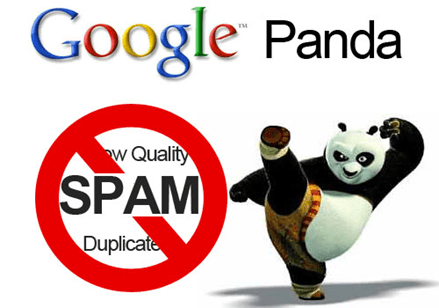
This panda algorithm is all about content not about links, or not about having any HTTPS sites. This algorithm just only focuses on the great quality content eliminating the spammy things which help in increasing the quality of the web.
Google Panda will affect and penalize the websites with:
- A website with thin or low-quality or too short content
- SEO over-optimization (using Black Hat SEO techniques) sites
- Slow website loading
- Too many advertisements
- Improper SEO structure
- Using duplicate content
- Too many broken links
If there a sudden fall in your traffic then your website is going to affect by Panda. And if panda hits or penalizes your website then you can recover by:
- Removing low quality or duplicate content from your site and adding quality content
- Implement SEO techniques but don’t over-optimize it
- Use Google webmaster tools and try to fix all the issues reported in that tool
- Restructure the complete pages and try to remove unnecessary advertisements
- Avoid and keep a look at spelling and grammar mistakes
- Do not link to some low quality or penalized websites this may lose your rankings
After cleaning up your website then you can submit a reconsideration request to google have patience and wait for the result.


